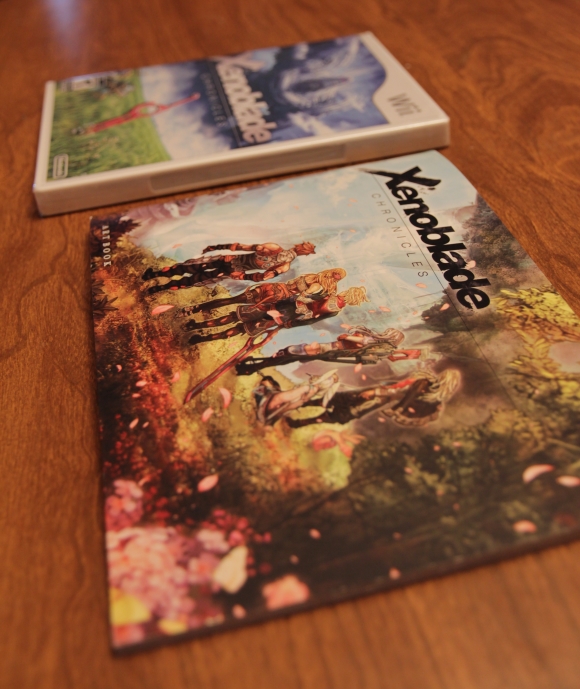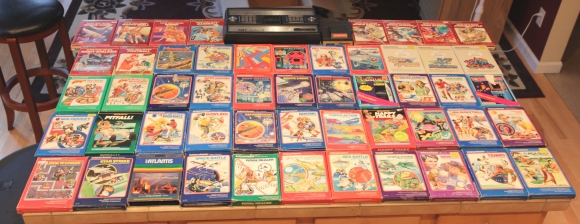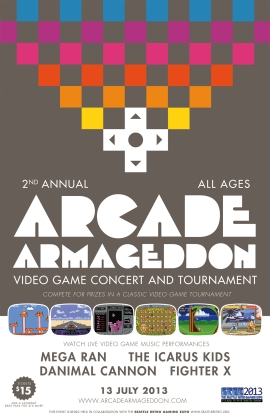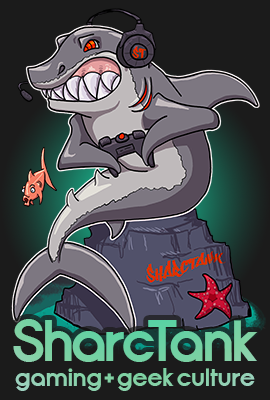Seattle Retro Hosts CF Foundation Silent Auction
- Details
- Written by SRGE
- Published: 13 June 2014

In March of 2014, SRGE lost one of its biggest fans. Michelle Taylor, the wife of Sean Taylor, the Director of Operations for SRGE. This year, SRGE would like to dedicate its 2014 show to Michelle in her memory.
Michelle was just 31 years old when her life was cut short. She was born with Cystic Fibrosis, an immune deficiency disease that affects thousands of people, and takes the lives of over 500 people a year. She never let her life be limited by her disease. She became a Registered Nurse, married the love of her life, and lived life to the fullest up to the very end. This year, SRGE is working with the CF foundation along with Great Strides to put together a charity auction with 100% of the proceeds benefiting the CF Foundation.
With the help of our awesome crew, and with the generous donations made by vendors as well as staff, we hope to further continue the research of CF and fight to find a cure.
Without spoiling the surprises of everything that will be at the auction, we have decided to release some information on the items that will be on display to be auctioned off June 28th and 29th.

First is a sealed copy of Xenoblade Chronicles. This is the first release of the game, and comes with the pre-order bonus art book. Get this while you still can!

Next we have a HUGE Intellivision lot! It includes one working Intellivision with Intellivoice attachment, and 53 games, NO DOUBLES, and 52 are boxed! Start your Intellivision collection off big with this great lot!
We have many more items that will be at the show. Don’t miss out on this great opportunity to benefit your collection as well as help save lives! Get your tickets today!
Be sure to follow us on twitter and facebook for more information.
The third annual Arcade Armageddon is happening at SRGE 2014!
- Details
- Written by SRGE
- Published: 30 May 2014

Arcade armageddon is a The Wizard style tournament and chiptunes show! The prelims will be held at the Seattle Retro Gaming Expo during the day on Saturday June 28th be a top scoring finalist by playing the Nintendo Campus Challenge cart to move on to Arcade Armageddon!
The show will take place Saturday evening at the Convention Center after SRGE, front and center on the Seattle Retro Stage! The show alternates between gaming competition and live music, to keep the action going!
THE GAMES:
SNES: Pilotwings, F-Zero, Super Mario Bros.
Gamecube: Mario Kart Double Dash
Nintendo 64: Goldeneye
PSX: Super Puzzle Fighter II
FINAL SECRET GAME
THE BANDS:
More to be announced!!
Even if you are not in the competition, this will be an amazing show! Last year was the first we worked with Arcade Armageddon and it was a BLAST! We are very excited to host them this year!
Tickets for the Seattle Retro Gaming Expo and Arcade Armageddon are available here.
SRGP 112 - Last Of Us, Taco Time vs. Taco Bell, AI, and Special Guest Carlos Rodela
- Details
- Written by Nathan
- Published: 03 March 2014


Kinsey, Rob, and Nate are joined by Carlos Rodela in this super-sized podcast full of gaming goodness! This Last of Us vs Brothers, Taco Bell vs. Taco TIme, AI conversations and more! Please note we had some techincal difficulties this time around; There will be a few brief interludes as we restart the recording equipment.
Guest Post: How To Review Retro Video Games
- Details
- Written by Guest
- Published: 09 November 2013

Today, we have a special guest post by Anthony Luna of RetroFiends.com. Enjoy!
The retro gaming community grows every day. A natural development, "Retro Gamers" are a sub-culture growing from Gamer Culture. As the internet becomes increasingly accommodating to niche journalistic efforts, retro gaming websites pop up almost every day. Anyone can write an article about their favorite classics, and anyone who wants to should. However, unlike conventional game journalism, there are some points which should be noted that are unique to retro video games.
Before we begin, we should define what a retro video game is. Merriam-Webster defines "retro" as "relating to, reviving, or being the styles and especially the fashions of the past: fashionably nostalgic or old-fashioned." Additionally, Wikipedia defines retro as follows: "Retro is a term used to describe aspects of modern culture which are consciously derivative or imitative of those trends, modes, fashions, or attitudes of the recent past which have or had come to be seen as unfashionable. It generally implies a vintage of at least fifteen or twenty years."
So from these two sources, we can bring together the idea that something is "retro" when it is indicative of the past of approximately one adult generation or longer. If we apply this to video games in the most lenient example of 15 years, the Dreamcast will become retro near the end of this month (November, 2013) as it launched in Japan November 27, 1998. This does not, however, allow for it's games library, which continues to grow even in 2013 despite all official releases for the system seizing in 2007. However, if we go back to that point made in both definitions, relating to or being derivative of, we can account the entirety of the Dreamcast's collection and modern games that are derivative of the eras prior.
However, thing's aren't quite that easy, although I sometimes wish it would be. Where fashions in art as a whole do tend to grow at fairly predictable rates (That's so 80's, 1920's, etc), technology actually advances at a far faster rate. Consoles grow several times stronger with each generation, with generations lasting in some instances in a few years. Considering we're just into the 8th generation of video game consoles, some may see the PS2, Xbox and GameCube as retro at this point, especially due to the fact that by now these consoles are far from fashionable and almost all official support for them is dead.
So, your first task is to define what retro is to you and why. Once you've tackled that, as your stance on retro gaming is will indeed be a definitive characteristic of your works, you can move on to writing wonderful content.
As I said in the beginning of this article, there are several points to consider when writing a review for a retro video game. If we break down what a review actually is to it's core, what we're left with in the end are Expectations and Realizations of those expectations. This is true to both modern and retro opinion pieces, but what differs most is the approach we use to come to that point.
Unlike modern games, where we have expectations what a video game of it's kind should be, retro games bring expectations of how a video game of it's kind should have been. As such, our criteria of how a game realizes our expectations should actually be more strict, not less. This means that in order to really write a review of a retro video game that accurately tells the reader how a game fares, we must have a thorough understanding of others games in it's era. In short, you must know how a game compares to other similar titles of it's era.
Under no circumstances should we be apologetic about what game hardware was capable of in it's day. It's a rookie mistake to say "oh, all PS1 game's looked horribly pixelated and blurry" or "music back then was bleeps and bloops, so what" and then apologize for it in the name of unashamed nostalgia. You should be able to understand the difference between a mess of pixels and good art direction. You should be able to understand the difference between bloops and bleeps and competent music compositions. And more importantly, you should know what was potentially possible in any department of a video game before passing that judgment. You don't need to compromise rationality to review older games. Retro film critics have been doing it for years with much success, retro games are no different in that regard. No tutorial on earth can teach you what is good and bad when it comes to interactive media; you must learn by playing the games. So, if you can only distinctly remember a number of games less than you have fingers, it's probably best you back off for now until you've had more experience under your belt.
Writing reviews for retro video games allows you some freedoms you usually wouldn't have when reviewing a modern title. For starters, while writing about modern games which are increasingly plot driven with each generation, one must usually dance around discussions of plot very carefully so as to not spoil anything for your readers who are often merely coming to your content to decide whether playing the game for themselves is worth their time. While this may also be the case with some readers of your retro game reviews, more often than not people who are reading your content are already familiar with the game you reviewed. It sounds weird, but it's true. Additionally, enough time would have passed that anything that is worth spoiling has already been spoiled countless times anyway. (Aeris dies!) This means you can get into the plot of games, where applicable, as deep as you feel necessary.
Since we're not catering to people who need to know things and need to know things right now, we have the opportunity to drop the dreadful numbered rating system. If you really feel you must use it, by all means do so. I experimented with them once, but ultimately found they added nothing of actual value to the content I wrote. People look at rating systems to see if a game is good. In the end, though, the numbered rating system is incredibly arbitrary. Expressing emotion and opinion in a number is always a rough and personal estimation. If describing these opinions with a number was actually effective, the medical pain chart wouldn't be the laughable mess that it is. Instead of saying 6/10 for a passable game (or 8/10 for the IGN equivalent), why not just say in actual words how good the game is, and why?
Finally, one more freedom you have when reviewing retro video games is the form factor in which you can release your content. Again, when it comes to modern reviews most people just want to know if a game is worth their time and money. But with retro games, the content is known as "ever green content", which never gets stale. As such, there is a lot of room to be creative with your work should you decide to be so.
A few examples:
- Classic Game Room is incredibly laid back. While it may lack a lot of intellectual discussion, the humour is often surreal, and the format it's presented in isn't unlike a radio talk show host. The host may have a habit of liking nearly every thing he gets his hands on, but he is none-the-less entertaining.
- The Angry Video Game nerd is a relatively famous name in the retro gaming community for his works that would make some pulp fiction writers blush. He services a very angst ridden crowd, but he does so by being actually funny and charming unlike the hundreds of knock offs that followed soon after. If you're getting into retro game reviews, it's probably best you avoid lifting from AVG in any way or else be washed away with hundreds of other "me too!" people. In fact, don't even tag any synonym of upset to your review name whatsoever. All positions have been filled.
- Teddy Rubskin is the one exception to the above rule of not lifting AVG. Teddy Rubskin is a foul-mouthed, shades wearing teddy bear who reviews many old games with some amusing commentary. He's not a "big name" in the retro gaming community, but he really should be. He's since layed off of the AVG similarities but it was always a joke anyway and even then it was amusing.
- Hardcore Gaming 101 has insanely thorough, perhaps archival quality, articles and has a definite slant to obscure but otherwise great games. They definitely cater to fans of "hidden gems", such as myself, with much of their content being so rare that the games they write about often aren't even on hidden gem lists until some time after they've written about them. Their website may look a bit dated, with an entirely black 90's look and feel, but I think it works for the content they provide.
Anyway, the point is, just be yourself. Cliche, I know, but the saying really holds true right here. Personally, I kind of take the librarian approach, with an end goal of trying to review everything. My intent is to inform more than to entertain, but supplemental tools such as twitter allow me to interact with the community in a more laid back and off kilter manner. If you want to do more than your initial journalistic efforts allow you to do, don't force it into your work, you'll soon learn that you can expand into other areas such as the aforementioned social networking to fulfill those needs.
Understanding what has been written so far, your ability to write effective reviews will depend on your command of journalism as a whole. There's a lot to learn, but the best way to get better at this is by doing it. Write often, and compare your work to others you look up to for inspiration. Analyze what others do and whether it works or doesn't work, and then try to apply what you've learned in future writings. There is always room for improvement, but please do refrain from contracting DeviantArt syndrome. Never let people reading your content go to your head, always accept the fact that you have plenty of room to improve your craft, and always be ready to accept and apply valid criticisms. After all, if you were really that big of a deal, you'd probably be writing for one of the big guys and not reading tutorials. I myself, am obviously not immune to the need to improve.
If you want to write retro game reviews, but don't want to run an entire website or blog about it, there are plenty of other avenues to explore. You can offer to do guest posts (such as this one!) or join on with content farms like about.com or squidoo.com. If however, you do want to start up your own website, blogger.com and wordpress.org are incredibly easy to use and free entry points.
In closing, I hope this article gave you some insight on writing retro game reviews. There's a lot to learn, and short of writing a book, there isn't much more I can write without the article becoming to sprawl. The best advice I could possibly give people interested in writing retro game reviews is to simply do it, and keep doing it for a long time. Over time you will surprise yourself with how much you've grown, and perhaps even cringe at your past works. But you must at the very least start.
Anthony Luna – http://RetroFiends.com







